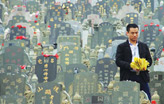Asia
Japan seeks French, US expertise in nuke crisis
Updated: 2011-04-01 06:54
(Agencies)
TOKYO, Japan - Japan is increasingly turning to other countries for help as it struggles to stabilize its tsunami-stricken nuclear plant and stop radiation leaks that are complicating efforts to recover the bodies of some of the thousands swept away by the towering wave.
|
![Katsuyuki Takahashi sits outside a destroyed family house where he was born in Kesennuma, Miyagi Prefecture, twenty days after the area was devastated by a magnitude 9.0 earthquake and tsunami March 31, 2011. [Photo/Agencies] Japan seeks French, US expertise in nuke crisis](../../attachement/jpg/site1/20110401/002170196e1c0eff47c012.jpg) Katsuyuki Takahashi sits outside a destroyed family house where he was born in Kesennuma, Miyagi Prefecture, twenty days after the area was devastated by a magnitude 9.0 earthquake and tsunami March 31, 2011. [Photo/Agencies] |
French, American and international experts -- even a robot -- are either in Japan or on their way, and French President Nicholas Sarkozy visited Tokyo on Thursday to meet with the prime minister and show solidarity.
Workers are racing to find the source of contaminated water that has been pooling in the Fukushima Dai-ichi nuclear plant since the March 11 earthquake and tsunami. The leaks have often forced workers to flee the plant, preventing them from restarting important cooling systems.
A spokesman for plant operator Tokyo Electric Power Co said Thursday that radioactive contamination in groundwater 15 yards (meters) under one of six reactors there had been measured at 10,000 times the government standard. It was the first time the utility has released statistics for groundwater near the plant.
The elevated levels were yet another sign of leaking radiation. Still, spokesman Naoyuki Matsumo said the drinking water supply was not affected, which is the main way people might be harmed by iodine-131, a radioactive substance that decays quickly, with half disappearing in eight days.
Experts from French nuclear giant Areva, which supplied fuel to the plant, are helping figure out how to dispose of the contaminated water that has begun leaking into the ground and the sea.
"We are not a supplier only for happy days," CEO Anne Lauvergeon told reporters in Tokyo on Thursday. "We are effectively also there when things become difficult."
Officials from the plant operator, Tokyo Electric Power Co, said they welcome the help.
"US nuclear plants aren't by the ocean, unlike Japanese ones, so we think the French may be able to help us more than the Americans," said TEPCO Manager Teruaki Kobayashi.
Officials with his company also said they expect to use a remote-controlled robot sent by the US within a few days to evaluate areas with high radiation. They are also setting up a panel of Japanese and American nuclear experts and American military personnel to address the crisis.
Tens of thousands of people have been displaced by the tsunami and magnitude-9.0 earthquake. Some saw their homes destroyed by the wall of water, while others have been ordered to leave a 12-mile (20-kilometer) zone around the plant because of radiation leaks. Authorities have recommended that people in a 20-mile (30-kilometer) band might also want to leave.
Frustrated evacuees had begun trickling back into the smaller zone to gather belongings and check on their homes, but officials in Fukushima prefecture posted warnings at evacuation centers telling them not to go back for any reason.
"There is not only a risk that you may be contaminated, but also that you could contaminate others in the evacuation centers when you return," the warnings said. "The national government is now considering whether to allow brief return visits, so please bear with us."
The radiation has forced police officers trying to recover the dead from the evacuation zone to don white hazmat suits and radiation monitors. Officials believe more than 19,000 people died, but so far only about 11,000 bodies have been found. Local media estimate that hundreds of corpses remain.
"We find bodies everywhere -- in cars, in rivers, under debris and in streets," a police official from the hard-hit Fukushima prefecture said Thursday. He spoke to The Associated Press on condition of anonymity because he was not authorized to speak to reporters.
In the small coastal city of Miyako, many people still have no idea what happened to their relatives. Residents watched intently Thursday as a firefighter in a boat and two tractors cleared the bay of rubble, part of cleanup efforts under way along hundreds of miles (kilometers) of Japan's northeastern seaboard.
Giant tractors and dump trucks cleared roads and sorted debris into giant piles. Huge barges with onboard cranes docked offshore and scooped up wreckage in the shallow bays.
"I lost three grandchildren," says Isamu Aneishi, 69, who sat on a log for hours and watched the men search the bay.
A vacant lot outside Miyako has been turned into a car graveyard, with hundreds of wrecked vehicles from across the region deposited in neat rows. Some looked ready to be driven away, while others were little more than mangled heaps of metal. Many were marked with red spray paint, indicating bodies had been found inside, and some still had keys in the ignition. Residents walked up and down the rows looking for their cars.
"This is my third time coming here," said Yasuhiro Ichihashi, 42, who watched his car get swept out of the parking lot at his factory from high ground. "They keep adding more cars every day, so I come back to check."
Specials

Fill dad's shoes
Daughter and son are beginning to take over the family business of making shoes.

Have you any wool?
The new stars of Chinese animation are edging out old childhood icons like Mickey Mouse and Hello Kitty.

Virtual memorial
High-Tech touches to traditional tombsweeping festival help environment



